Remove Your Submersed Boat
Is your boat starting to sink? If you’re looking for sinking, submersed, or already sunken boat help – look no more! We haul, transport and completely remove any sunken boat, sailboat, yacht, cruiser, catamaran and more. Get a price to recover a sunken vessel with Boat Remover. For more information or prices, contact us!
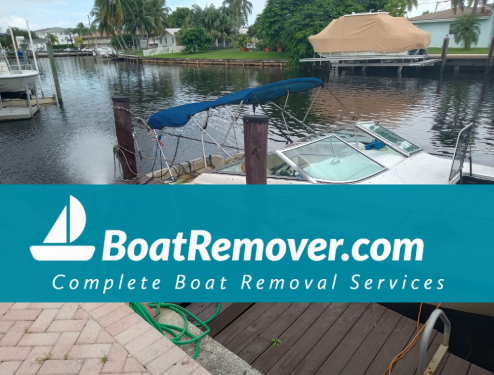
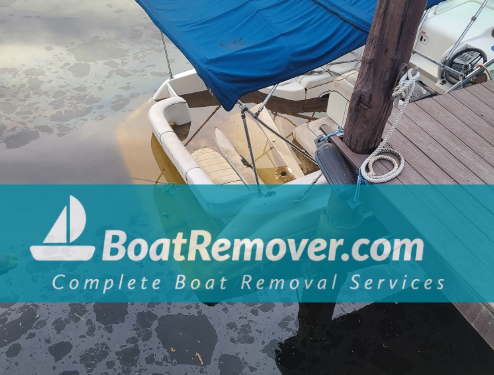
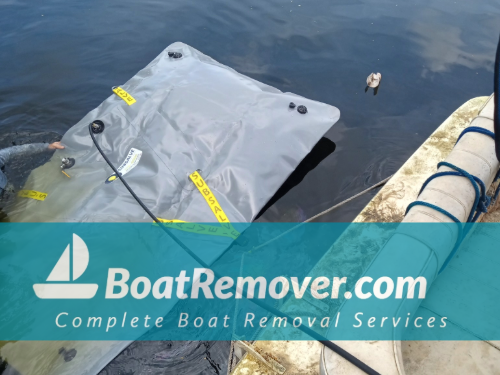
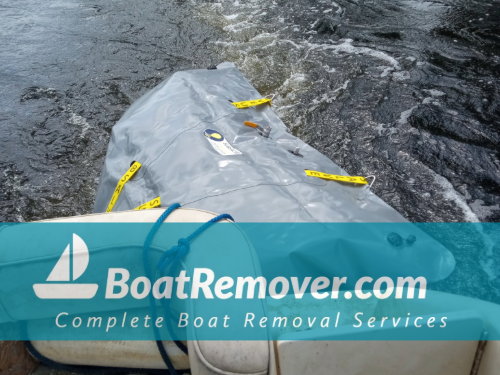
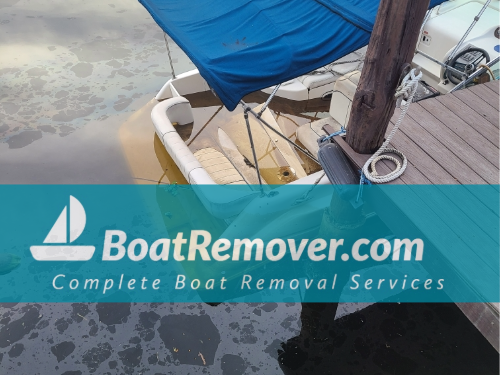
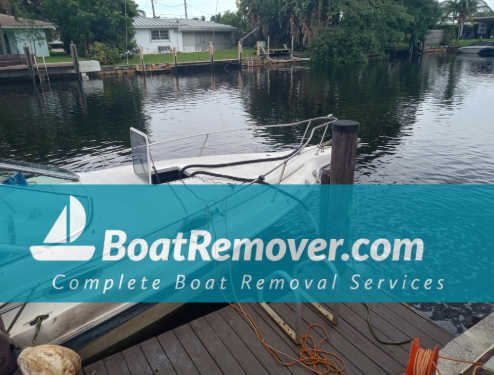
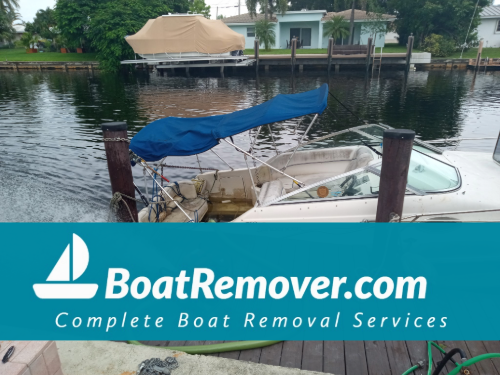
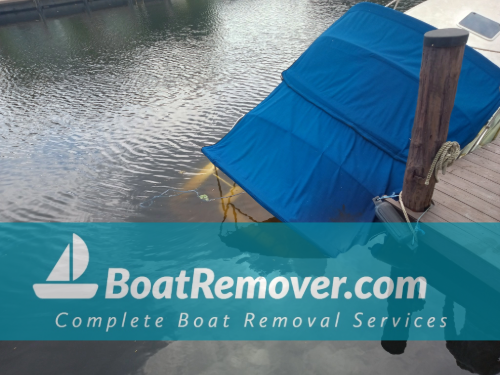
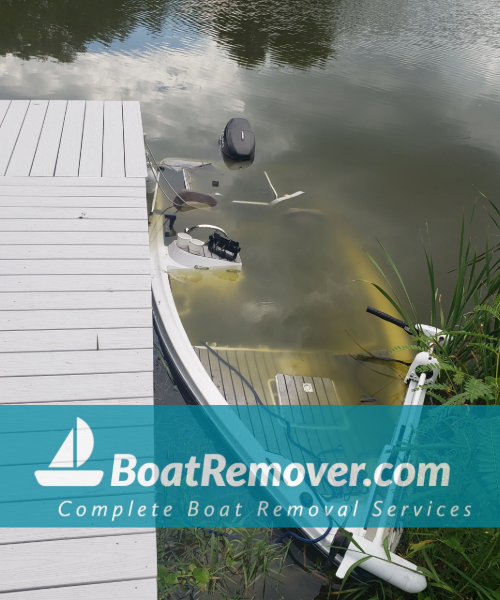
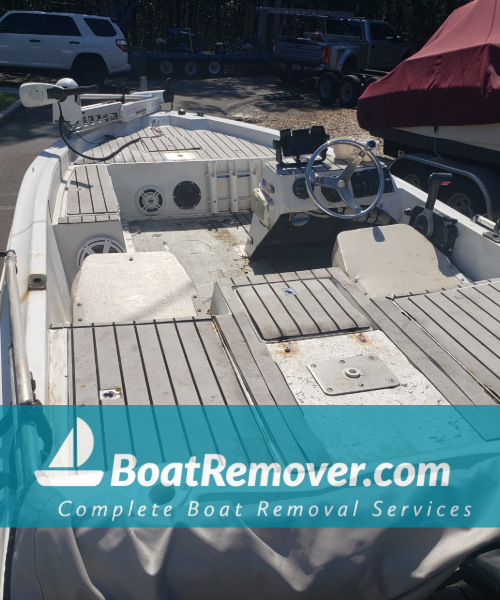
- Why’d My Boat Sink
- Have a Plan to Recover a Sinking or Sunken Boat
- The End of Your Junk Boat or New Beginning?
- Why Not Leave the Boat – Makes a Great Fishing Hole?
- The Price of Sunken Boat Removal
- DIY Boat Recovery or Professional Boat Removal?
- Hiring a Boat Removal Company
- What Expenses Are Involved in Boat Removal & When Can It Become Pricey?
- Do-It-Yourself Sunken Boat Removal
Why’d My Boat Sink
There’re many scenarios that can lead to a sinking or sunken boat like bilge pump failures, undetected leaks, a real nasty storm that causes the vessel to capsize or take on water faster than you can pump it out.
It’s not always easy to keep a boat afloat. However, there are readiness recommendations that can in most cases prevent careless boat failures. For one, having a float-actuated bilge pump should be a must. A smidgeon of maintenance goes a long way when it comes to boating, sailing and keeping your vessel afloat.
Sinking a recreational boat or fishing vessel is not difficult. Actually, It’s not hard at all. A small leak, or enough rainwater paired with a broken bilge pump or dead battery alone could lead to a sinking boat. Also, nothing is secure when the tide and storm surge come rushing at the docks. Major storms, such as Hurricane Irma, can cause a band of boat devastation.
A sinking vessel can occur unexpectedly and without warning. Lack of maintenance, a major storm, an accident, or mishandling a vessel often contribute to a sunken ship. There’s a good chance that the sunken boat can be salvaged, if you so desire… Most of our customers just want the boat floated, towed, dismantled and disposed of.
Never mind how your boat sank, or is sinking – it happened, whether hurricane, tropical storm, bad captaining, rough seas, broken bilge pump or float switch, hull damage or what have you… either way the boat you adore is now resting on the ground floor of the waterway or lopsided and discombobulated. The first step to recovery (even boat recovery) is accepting the things you can’t change. So, what now? Start planning your boat’s recovery!
Have a Plan to Recover a Sinking or Sunken Boat
When rescuing the sinking, submersed, or completely sunken boat it’s best to take a cut once – measure twice attitude. Boat recovery efforts include but are not limited to logistical planning, equipment staging, trucks / trailers / tow boats needed, personnel briefing. Also, crew managers factor in tide levels, wind / weather, navigational plans / markers, plan a, b and c… all of which should be mapped out before starting a job.
The End of Your Junk Boat or New Beginning?
What’s the purpose of removing the sinking boat, is it because the vessel was tagged derelict by the FWP and you face fines or threatened with jailtime? Or because you’d like to recover and work on the boat after hauling it out on the dry?
85% of the boats we’ve recovered from submersion were one a one-way trip to our boat crushing lot. Why? As you very well may already know – the cost of boat repairs and fixing is usually more than the cost of a replacement… not to mention repairs are difficult to gauge on the water, expensive to fix on the dry and can only be truly tested once revisiting the water… once the vessel is hauled out on the dry you’re also paying for storage, hopefully not at a seasonal or transient rate!
Why Not Leave the Boat – Makes a Great Fishing Hole?
Whoa, ok, let’s start by saying: we neither approve nor deny this idea, and this statement, website or webpage is not to be viewed or construed as a legal opinion we’re merely stating general information, and our opinion.
If you’re thinking about leaving the boat sunken as it sits, we get it. Perhaps the recovery costs are too high, and you’d rather pay for a new boat verse remove an old one… again – we get it.
Unfortunately, some people hardly have the option because the boat was identified and tagged as being your registered responsibility, or you’re having a hard time selling your house with a boat poking up near your dock, maybe the HOA is coming down on you and threatening fines… all of which are real world everyday scenarios for boat owners and our customers alike.
Okay so making an artificial reef might please some fish, and fisherman just please ensure that during your sinking sneaky op, the boat doesn’t become a navigational hazard or waterway death-trap.
Another consideration that should sink in, a boat fresh on the sink scene is probably leaking diesel, gas or oil which if traced to you could come with a hefty fine.
So, if you do decide to resupply the ocean floor wreckage collection, be sure to keep in mind some of the paragraphs mentioned above.
The Price of Sunken Boat Removal
The price of removing a boat can be compared to the price of removing a tree. We just have to figure out if you’re removing a pine tree, or oak tree. So, without heightened dramatic effect (drumroll), here goes the average recovery cost of a sinking, submersed, or sunken boat.
It’s heartbreaking to see someone’s boat sinking, it’s even more aching to discuss the fees to recover and remove a sinking boat. But here it goes:
Hiring a salvage, boat removal / recovery company for vessels 15-25ft on average costs start between $3,000 – $6,000. The number depends on the height / length / beam of the boat, vessel disposition, location, type of boat to name a few.
25ft – 30ft vessel recovery ranges start closer to $5,000 – $8,000, and vessels 30ft plus in length start around $8,000.
Sunken Boat Removal may come with a tear-jerking price tag, however that’s because it’s an expensive to operate operation… coupled with high liability. If you want to delve deeper into the boat removal abyss, read on. Boat Removers have plenty of cry-worthy substance for you.
DIY Boat Recovery or Professional Boat Removal?
Will you actually save money by attempting a DIY trial run? With the price of Marine Salvage and Sunken Boat Rescue, the thought of doing it yourself might seem tempting. But hey, if you’re feeling fearless and have the equipment, tow boat, trailers, recovery equipment, and some experienced people then perhaps. Unless you have recovered boats before, most likely, you will have to hire professionals to do it for you.
Hiring a Boat Removal Company
When you decide to hire a company, Boat Removers pricing is quoted job specific – there’s usually no blanket pricing. Although we do have dispatch minimums. That is the minimum to dispatch a boat, truck, trailer, or personnel.
Boat Removal pricing variables include location, distance from haul-out / boat ramp, size and dimensions of the boat (length, beam, height, weight), type of boat (sailboat, yacht, cruiser etc.), after action (dismantle, salvage, disposal).
Quotes given with a per-foot pricing model usually are for boats on land, or boats on water not taking on water.
Don’t wait for your old boat to start taking on more water than the bilge pump can handle, because when a vessel has been sunk the price changes for boat removal are visible, and often double. Your boat will go from needing a tow boat, haul-out / trailers, and disposal fees to needing divers float bag deployment and essentially more people and resources.
What Expenses Are Involved in Boat Removal & When Can It Become Pricey?
- Fuel Costs to Deploy Trucks (mostly diesel) for Transport.
- Fuel Costs to Deploy a Tow Boat.
- Boat Trailer Maintenance Costs.
- Dispatch Personnel with Boat Removal Experience.
- Haul Out / Crane Expenses (Optional If Needed).
- Deploy Water Pumps, Float Bags (Optional If Needed).
- Deploy Diver(s) (Optional If Needed).
- On or Offsite Boat Demolition Machinery.
- Personnel to Operate Demolition Machinery.
- Any Miscellaneous Cost of Disposal (Fuel, Tanks, Engine)
Do-It-Yourself Sunken Boat Removal
If you’re still pondering the DIY Sunken Boat Removal idea, then it’s time to have that discussion. Full Disclaimer – this statement, article, website or webpage is not to be viewed or construed as legal opinion, we’re merely stating general information, and our opinion.
Travelling this boat removal road might save you a few bucks, but you won’t save time or stress. Still, this might be one of the most thrilling DIY projects you take on this week. Start by anchoring an operable boat down current from the sunken vessel. Dive down and connect lift bags to the boat. Don’t attach the lift bags to cleats or rigging, or anything that could be damaged from the force of pull especially if you are using large lift bags – rather run a few strong belts under the boat and attach the lift bags to each of their ends.
Smaller lift bags can be attached to the cleats for stability. Fill the lift bags with air using an air compressor. Once the boat floats just below the water surface, begin pumping the water out from it. If you survived thus far, or haven’t drifted away, the boat will need to be towed to the dry, assuming the engine, and/or sails are not practically repairable from sea.
Boat Disposal
- Boat Disposal Safety
- Boat Disposal from Water
- Boat Disposal Options
- Regulatory Compliance
- Environmental Factors
- Dismantling and Recycling
- Boat Disposal from Land
- Disposal Methods
- Environmental Compliance with Boat Disposal
- Factors Affecting the Cost of Boat Disposal
- Transportation Logistics in Boat Disposal
- Boat Disposal Method and Facilities
- Environmental Compliance Requirements
Boat Disposal Safety
Safety is paramount during the boat disposal process to prevent accidents, injuries, and environmental incidents.
Boat owners or operators should take appropriate safety precautions, such as securing the vessel, disconnecting fuel and electrical systems, and removing hazardous materials before disposal. Personal protective equipment (PPE), safety barriers, and warning signs may be used to minimize risks and protect personnel involved in the disposal operation.
Boat Disposal from Water
Boat salvage ops from water and complete boat disposal from the water typically involves salvage strategies to retrieve, transport, and dispose of the vessel safely and responsibly.
Boat Remover operators utilize our equipment such as towboats, salvage vessels, cranes, and lifting devices to extract the boat from the water and transport it to a designated disposal site. Salvage operations may include on-water retrieval, stabilization, towing, and offloading procedures to facilitate the disposal process.
Boat Disposal Options
Boat disposal options from water may include recycling, landfill disposal, or incineration, depending on factors such as the boat’s condition, material composition, and environmental regulations.
Salvage operators work with disposal facilities to determine the most appropriate disposal method based on environmental considerations, waste management practices, and regulatory requirements. Disposal methods aim to minimize environmental impact and maximize resource recovery through sustainable practices.
Regulatory Compliance
Boat disposal must comply with local, state, and federal regulations governing waste management, pollution prevention, and environmental protection.
Boat owners or operators are responsible for ensuring compliance with applicable laws and regulations, obtaining necessary permits or authorizations, and adhering to prescribed disposal methods and procedures. Failing to comply with regulatory requirements can result in fines, penalties, and legal liabilities.
Environmental Factors
Boat disposal has potential environmental effects, particularly if the boat has hazardous materials or pollutants.
Boat Remover, boat owners or operators must detect and manage environmental risks associated with disposal, such as fuel, oil, batteries, chemicals, and marine debris. Proper containment, handling, and disposal of hazardous materials are essential to prevent contamination of waterways, soil, and wildlife habitats.
Dismantling and Recycling
Once the salvaged boat is transported to a disposal site, it may undergo dismantling and recycling to recover valuable materials and components for reuse or recycling.
Salvage yards or recycling facilities specialize in dismantling boats, segregating recyclable materials such as metal, fiberglass, and plastic for processing and resale. Salvaged components such as engines, electronics, and fittings may be refurbished, resold, or repurposed for other applications.
Boat Disposal from Land
Transportation to Disposal Site: Boat disposal from land involves transporting the vessel from its current location to a designated disposal site or facility.
Boat owners or operators may use trailers, flatbed trucks, or specialized equipment to transport the boat to the disposal site safely and efficiently. Transportation logistics may vary depending on factors such as the vessel’s size, weight, and accessibility, as well as road conditions and regulatory requirements.
Disposal Methods
Once the boat reaches the disposal site, it may undergo different disposal methods, including dismantling, recycling, landfill disposal, or repurposing, depending on environmental regulations and waste management practices.
Salvage yards, recycling facilities, or waste management facilities specialize in processing and disposing of boats in accordance with applicable laws and regulations. Disposal methods aim to minimize waste generation, maximize resource recovery, and mitigate environmental impact through sustainable practices.
Environmental Compliance with Boat Disposal
Boat disposal from land requires compliance with environmental regulations governing waste management, recycling, and pollution prevention.
Boat owners or operators must ensure proper handling, containment, and disposal of hazardous materials, pollutants, and contaminants to prevent environmental harm. Compliance with regulatory requirements may involve obtaining permits, conducting environmental assessments, and implementing pollution control measures to protect public health and the environment.
Factors Affecting the Cost of Boat Disposal
Boat length, beam and condition are taken into consideration when pricing out disposal fees.
The size and condition of the boat significantly influence disposal costs, with larger vessels or those in poor condition requiring more labor, equipment, and resources for disposal. Factors such as hull material, structural integrity, and environmental hazards may also affect disposal costs, as specialized equipment or procedures may be needed to dismantle or dispose of the vessel safely.
Transportation Logistics in Boat Disposal
Transportation logistics play a base role in determining disposal costs, with factors such as distance, accessibility, and transportation methods influencing overall expenses.
Longer distances or remote locations may incur higher transportation costs, while specialized equipment or permits may be required for difficult-to-access sites or challenging terrain.
Boat Disposal Method and Facilities
The chosen disposal method and facilities can impact disposal costs, with options such as recycling, landfill disposal, or incineration varying in cost depending on environmental regulations, waste management practices, and facility fees.
Recycling or repurposing may incur additional processing or handling fees, while landfill disposal may involve tipping fees or waste disposal charges.
Environmental Compliance Requirements
Compliance with environmental regulations and permitting requirements can add to disposal costs, with expenses associated with obtaining permits, conducting environmental assessments, and implementing pollution control measures.
Boat owners or operators must budget for compliance-related costs to ensure legal and responsible disposal of the vessel while minimizing environmental impact and liability.
Boat Removal Topics
- Boat Removal Service – Start to Finish
- Fast Boat Removal
- Who Would Need a Boat Removed?
- Motorboat & Sailboat Recycling / Repurposing
- Boat Removal – States, Cities, Areas We Serve?
- Boat Removal VS Junk Removal
- Boat Removal for Hire
Boat Removal Quote
Contact Us
Email Us Directly: boatremoverllc@gmail.com
Get on the Schedule by Phone
Get on the Schedule Online
Locations
For coastal dispatch locations please visit: Locations.
Boat Removal Gallery
Visit the Gallery of Junk Boats, Recycled for Parts Boats.









